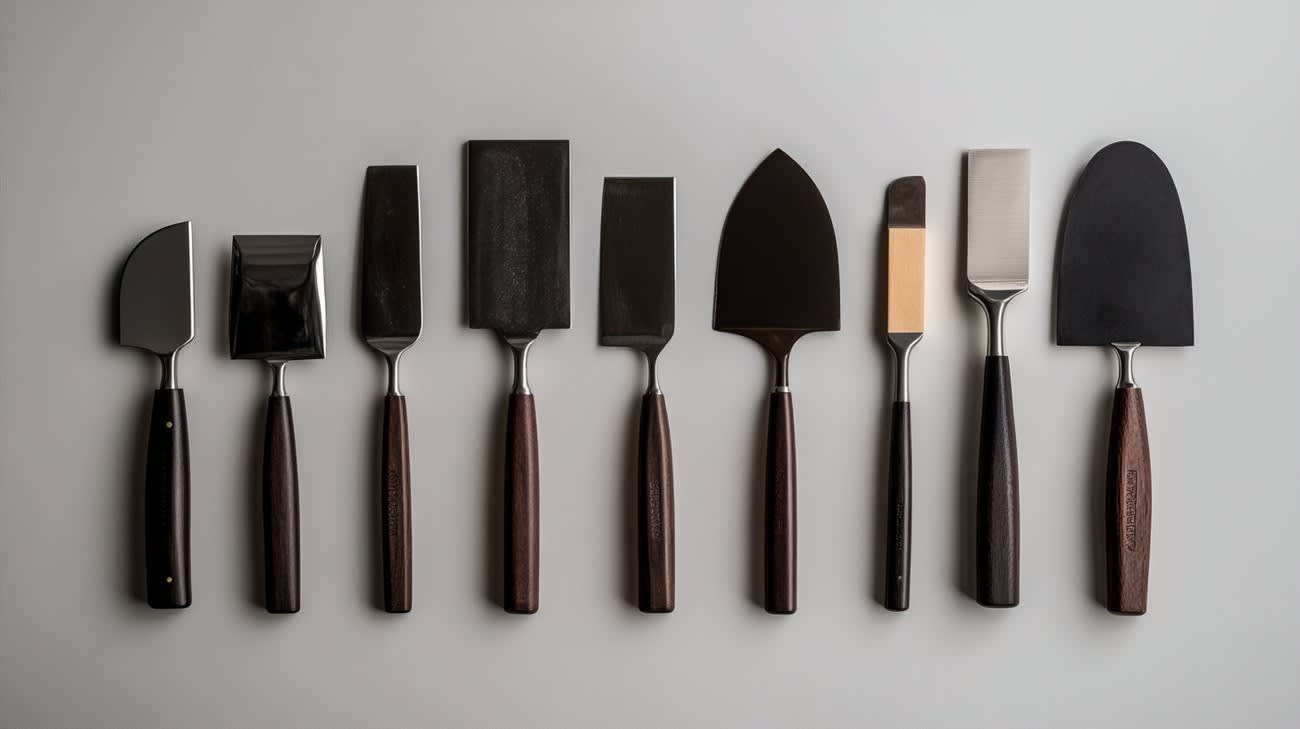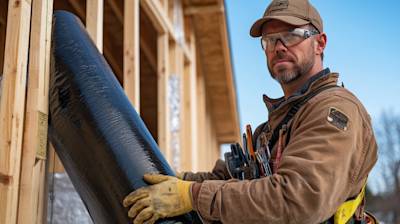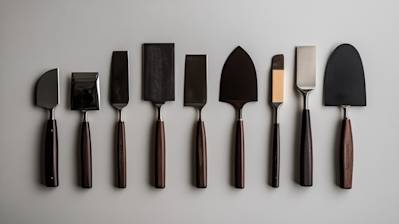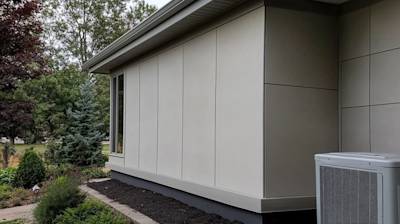The essential tool for any construction, masonry, or gardening job, a trowel, always comes in handy. This article provides an in-depth look into the world of trowels. You are here to learn about the different types, their uses, essential features, and picking the right one for your task.
What Is a Trowel?
A trowel is a small handheld tool with a flat, pointed blade, utilized to spread or apply substances like mortar or plaster. It is also handy for leveling, shaping, and excavating the material in gardening and masonry work. Their size and shape may vary based on the purpose they are intended for.
Different Types of Trowels
Gardening Trowels
Primarily used for digging small holes, breaking up earth, or removing weeds, gardening trowels are a must-have in every gardeners arsenal.
Mason's Trowels
Mason's trowels come in handy for spreading adhesives essential for construction such as mortar or concrete, across bricks or stone.
Plastering Trowels
These trowels have rectangular blades to smoothly apply plaster onto walls and ceilings.
Pointing Trowels
Pointing trowels are designed with a pointed tip primarily for shaping cement and reaching into smaller areas.
Power Trowels
Power trowels deliver more performance and speed in finishing large concrete surfaces at commercial sites.
Essential Features of Trowels
These fundamental trowel features can ease your work and provide a better outcome:
- Material: Trowels are generally made of steel, stainless steel, or carbon steel. Choose depending on your aim; a stainless-steel trowel resists rust and corrosion, a carbon steel one is suitable for heavy-duty tasks.
- Handle: Trowels may have plastic, wood, or rubber handles, impacting their grip and comfort.
- Size and Shape: The blade's size and shape largely depend on the type of trowel and its purpose.
How to Choose the Right Trowel?
Making the right trowel choice relies on recognizing the task at hand and understanding which trowel suits it best. Here's a simple guide:
- Recognize Your Task: Identify the specifications of your job. Are you going to be plastering or gardening? Maybe concrete finishing?
- Trowel Type: Choose the trowel type best suited for your job. For gardening, opt for a gardening trowel. For masonry or plastering tasks, pick a mason's or plastering trowel.
- Comfort: Always prefer a trowel that offers a good grip and is comfortable for extended use.
Taking Care of Your Trowel
Trowels require regular care, including:
- Cleaning after each use to prevent materials from hardening on the blade.
- If it's a steel trowel, oil them slightly to prevent rust.
- Store your trowels in a dry, clean spot, and keep them safe from dampness.
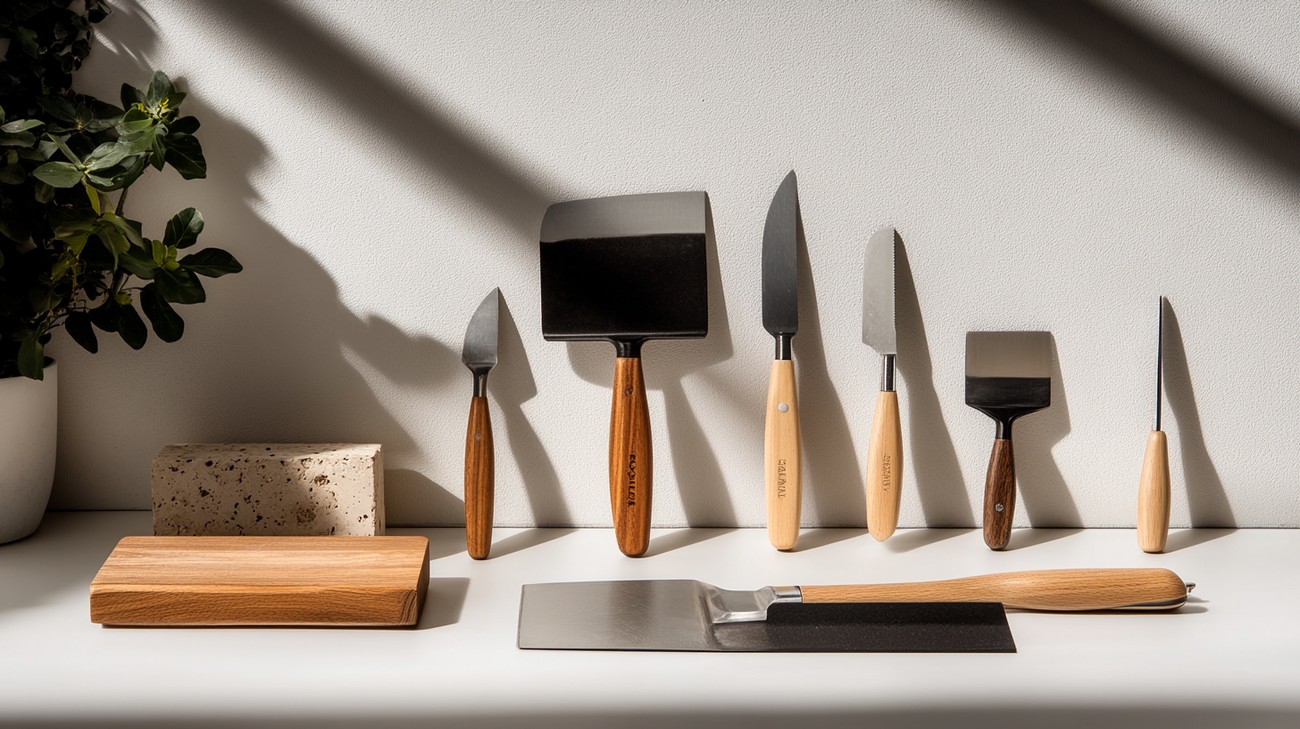
Frequently Asked Questions about Trowels
How is a Gardening Trowel different from an Archaeology Trowel?
While both are used for digging, a gardening trowel is typically more robust and larger since it's designed to break through soil and roots in gardens. However, an archaeology trowel is more delicate and smaller to help gently remove layers of soil while ensuring artifacts are not damaged.
What Factors Should I Consider when Choosing a Trowel?
When selecting a trowel, consider the size, handle comfort, material, and blade length. If you're doing heavy-duty gardening, a larger trowel with a strong handle might be necessary. For tasks like plastering or tiling, flat, wide trowels are desirable.
Can I Use a Masonry Trowel for Gardening or Vice-Versa?
It's not recommended to use a masonry trowel for gardening or vice-versa, as they are designed for different jobs. The narrower design of a masonry trowel is for spreading and shaping mortar, which wouldn't work efficiently for digging in the garden. Similarly, gardening trowels are not built to withstand the abrasive nature of cement or for precision work in bricklaying.
When Would I Use a Plastering Trowel?
Plastering trowels are used to smooth plaster or concrete surfaces, apply finishing touches, and flatten or round corners for a more polished look. When you want to achieve a professional finish on a plastered wall or ceiling, a plastering trowel is what you would use.
Is there a Difference between a Flooring and Gauging Trowel?
Yes, there is a significant difference between these two types of trowels. A flooring trowel is used to level, smooth, or apply adhesive and grout when laying floor tiles. A gauging trowel, on the other hand, is a masonry tool mainly used for mixing mortar and applying small amounts onto bricks or blocks in fine work.
What Materials are Trowel Blades Made Of?
Trowel blades are most commonly made of stainless steel or carbon steel, although plastic variants are also available. Both stainless steel and carbon steel are durable and long-lasting. However, stainless steel trowels are more resistant to rust than carbon steel ones.
How do I Care for My Trowel?
Regardless of the type of trowel, it's essential to keep them clean and dry. After using a trowel, remove any remaining material or dirt. Avoid leaving them outdoors since exposure to moisture can rust the metal parts. For steel trowels, a light coating of oil can prevent rusting and maintain its functionality.
Is There Any difference between a Left-Handed and Right-Handed Trowel?
The basic functionality of a trowel remains the same whether it's designed for left or right-handed use. However, left-handed trowels feature an angle or curvature suited to left-handed operation, making them more comfortable and efficient for left-handed individuals.

Pros of Trowels
Ease of Use
One of the overall benefits of using trowels is their ease of use. They are typically lightweight, compact, and do not require any technical expertise. This makes them accessible and user-friendly to everyone from the amateur gardener or DIY home renovator to the seasoned construction professionals.
Compactness
Trowels are well-designed to get into tight spaces where larger tools or your hands may not fit. This compactness is particularly beneficial in tasks like planting, where you need precision to place small seeds or bulbs at the right depth.
Versatility
Trowels come in different shapes and sizes, allowing versatility in various tasks. Masons trowels, gardening trowels, and archaeology trowels, for example, are just some of the many types available, each designed for a specific task in their respective fields.
Affordability
Compared to larger manual tools or power tools, trowels tend to be quite affordable. Even high-end trowels, composed of more durable materials, are generally not prohibitively expensive. This makes trowels a cost-effective choice for a wide range of tasks.
Durability
Many modern trowels are made of highly durable materials, such as carbon steel or stainless steel, that can resist corrosion and withstand repeated use in various conditions. Their sturdiness makes them a long-term investment that can serve their users over many years.
Cons of Trowels
Physical Effort
Despite their compact size and relative ease of use, trowels can often require a significant amount of physical effort, especially for prolonged use. This can be strenuous or cause discomfort in the hand and arm muscles, particularly for those not used to manual labor.
Inadequate for Large Tasks
While trowels are perfect for small scale tasks, they can be quite inefficient for larger, broader projects. For instance, it would be challenging and time-consuming to use a trowel for digging a large garden bed.
Potential For Injury
Certain trowels, especially those with sharp or pointed edges, can pose a risk of injury if not handled carefully. Users can accidentally prick or cut themselves while using the tool or even during improper storage.
Skill Requirement for Specialty Trowels
While general-purpose trowels are easy to use, some specialty trowels require a certain level of skill and expertise to use them effectively. For instance, using a mason's trowel to correctly apply mortar when building a wall is a skill often honed over time.
Durability Versus Cost
Although there are many durable trowels available on the market, they tend to come at a higher cost. On the other hand, cheaper trowels may not be as durable, potentially leading to frequent replacement costs. Hence, finding the perfect balance between durability and cost can sometimes present a challenge.

Myths and Misconceptions about Trowels
Trowels, those handy, small-sized hand tools with a flat, pointed blade made of metal, are regularly used in masonry, archaeological digs, and gardening. Despite their ubiquity, there are a multitude of myths and misunderstandings surrounding trowels and their usage. This detailed guide addresses those inaccuracies.
Myth 1: All trowels are interchangeable
One of the most widespread misconceptions around trowels is that all types of trowels are interchangeable. Many people believe that they can use a gardening trowel for construction work or an archaeological trowel for gardening.
Reality
This misconception couldn't be further from the truth. Each trowel type has a distinct design and purpose. Gardening trowels, for example, possess a pointed and curved design to help in planting and weeding. On the other hand, masonry trowels, like the brick trowel, feature a pointed, flat design for accurate application of mortar.
Myth 2: Trowels are not precision tools
Another common myth among non-professionals is that trowels aren't precision tools. They often are considered less accurate or effective for detailed work due to their unwieldy structure.
Reality
Contrary to this belief, trowels can be precision tools. Some types such as the pointing and gauging trowels in masonry or the margin trowel used for tight spaces in construction, are built to carry out precise work. Even in gardening, small trowels are used for transplanting delicate seedlings.
Myth 3: Bigger trowels are always better
There is a common understanding that bigger trowels are always better since they can move more material at once. This misconception may lead people to buy the biggest trowel they can find.
Reality
While larger trowels can indeed move more material, bigger isn't always better. The size of the trowel should be chosen based on the task at hand and user's comfort. A larger trowel may be unwieldy and tiring to use for detailed or extended work. Conversely, a smaller trowel may not be efficient for large jobs.
Myth 4: One trowel fits all hands
It is often believed that trowels are 'one-size-fits-all' when it comes to their handle sizes. This myth suggests that the size and design of the handle does not impact the user's comfort or the tool's effectiveness.
Reality
The reality is that trowel handles come in different sizes and designs to accommodate different hand sizes and grip styles. For efficient work and to prevent hand fatigue or even injury, it’s important to choose a trowel with a handle that fits comfortably in your hand.
Myth 5: Trowels don't require maintenance
Many people believe that due to their simple design and strong materials, trowels do not require any maintenance.
Reality
Just like any tool, trowels require maintenance for optimum performance and longevity. This can involve cleaning after use, oiling to prevent rust, and sharpening the edges for gardening trowels.
Myth 6: Older trowels are not as good as new ones
Last but not least, another general misconception is that older trowels are not as efficient or useful as the new ones, treating them as disposable tools.
Reality
While new trowels often benefit from advancements in materials and design, older trowels, if well-maintained, can perform just as well. In fact, some professional masons and gardeners prefer their 'broken-in' tools due to the comfort and familiarity they provide.
Through this detailed look at these widespread trowel-related myths and misconceptions, the hope is to enhance understanding about this simple yet essential tool and its effective use across various fields.
Summary
Trowels have existed for centuries, proving their importance and utility in a variety of fields. Whether you're a mason, plasterer, archaeologist, or an enthusiastic gardener, having a trusty trowel can be indispensable. They come in different shapes and sizes to fit a myriad of tasks, making the work much easier and more efficient. Each type of trowel is designed to provide the utmost precision and control, whether it's for laying bricks, plastering walls, digging in the garden, or unearthing artifacts.
All in all, trowels are extremely versatile tools. They handle a number of tasks that other tools would struggle with. Despite their small size, these handy tools can make a significant difference in the quality and speed of your work. It's no wonder that trowels are considered must-haves in many professions and hobbies.
So, whether you're laying the foundation of a house, creating an amazing plasterwork, excavating an archaeological site, or merely planting your favorite flowers in the backyard, trowels are the go-to tools. With the perfect blend of functionality and simplicity, a trowel offers a helping hand, which makes your job a whole lot easier. Just remember, like every other tool, it's essential to keep your trowels properly maintained for them to serve you well in the long run.
About Atlas Stucco
Meet Atlas Stucco of Sacramento, CA! We have been in the stucco business for years, accenting homes and commercial buildings with our impeccable skill and keen eye for aesthetics. Our team is committed to ensuring your satisfaction, always keeping quality and timeliness at the forefront of every project. We bring a fusion of traditional craftsmanship and modern techniques, which allows us to produce stunning finish jobs every time. Locally owned and operated, Atlas Stucco is a brand you can trust right here in Sacramento.
Tags: gardening, construction, hand tools,


